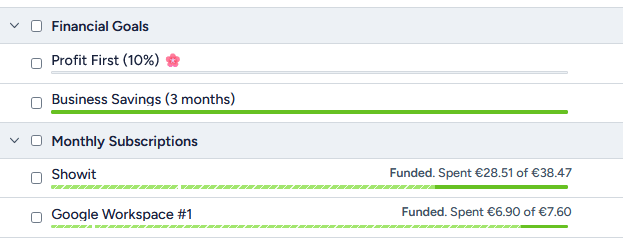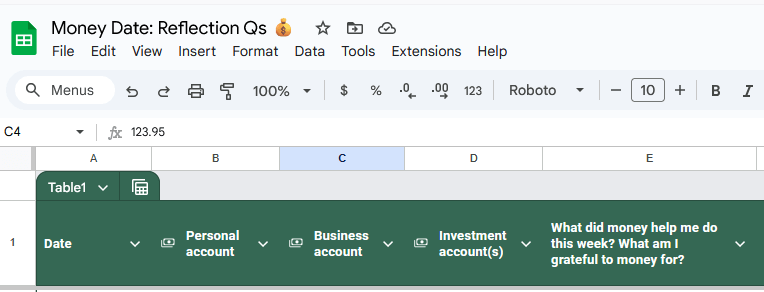My weekly money date routine has become one of my favorite workweek rituals as a small business owner.
This weekly ritual gives me the opportunity to pause, breathe, and take stock of where things stand in my business–financially and otherwise.
Whether I’m reviewing invoices, tracking expenses, or just marveling at how far my business has come, my weekly money date routine helps me quiet my anxious mind and stay focused on my goals.
💡 If you want to feel inspired to tackle your money goals, too, keep reading! I’m sharing the exact steps of my weekly money date routine below.
Why You Need A Weekly “Money Date” Routine As A Small Business Owner
If I could go back to 7 years ago when I started freelancing and tell my baby business owner self one thing, it would be this:
Get in the habit of looking at your money.
If we don’t look at our numbers regularly—both business and personal–things have a tendency to start feeling a bit… Wobbly.
🤷🏻♀️ It’s easy to assume we’re doing worse than we are–or to start making investments we can’t actually afford. (Hello, $2500 course I had no business buying!)
Plus, when you don’t have a clear idea of how your tasks correlate to your cash flow, the daily grind of being a small business owner can make you feel a bit… Apathetic.
(Why am I doing this again? Should I go get a “real” job after all?)
The truth is, money feels a lot less intimidating (and a lot more fun!) when you build a relationship with it.
And that’s what this weekly “money date” routine is all about.
How To Make Your Weekly Money Date Feel More Approachable
Look, I get it–examining your “money stuff” can feel uncomfortable at times.
There’s often a lot of shame, guilt, and general ickiness associated with looking at your numbers, especially if it’s been a while since your last check-in.
That’s why I strive to do everything in my power to make this experience as pleasant and serotonin-filled as possible.
For starters, rather than trying to squeeze it in between client work and marketing my own business during the week, I try to do my money date on the weekend (usually on Saturday).
When it’s time to sit down and look at my numbers, I bring out all the stops:
- My favorite candle,
- The expensive Pendleton blanket I received as a graduation gift
- A huge cup of coffee (duh) with the good milk
Most of all, I take the pressure off.
I have this mantra written down on top of my weekly money date routine checklist:
“Money requires attention, not perfection.”
This practice is not about becoming the undisputed master of your P&L sheet–or forcing yourself to do copious amounts of shadow work to heal your deepest money wounds.
🤍 It’s about showing up, exactly as you are, and working through the stuff that feels wobbly or challenging.
And if you can just do that? Trust me, you are doing enough.
My Weekly “Money Date” Routine As A Small Business Owner
Step #1: Setting the mood
First, I find a quiet, comfortable place to do my Money Date. Usually, it’s my desk–but sometimes I like to switch it up by setting up camp at the kitchen table.
✅ I make sure to gather all the things I’ll need ahead of time: my phone, laptop, and iPad, as well as a notepad and a pen.
Then, I put some effort into creating a cozy ambiance by grabbing a blanket, lighting my favorite candle, and picking a soothing playlist.
If I feel like I’ll need some extra positive vibes for this, I will play a reiki video on my second monitor and listen to positive affirmations on YouTube while I go through my money routine.
Step #2: Review business finances
The first “proper” step of my weekly money routine is dealing with the business side of my finances.
I start by updating my YNAB business account (my budgeting tool of choice–I use it both for business and personal), as well as my “official” accounting spreadsheet.

Then, I pull together every single receipt from that week, as well as any invoices that got paid, and place them into my Receipts folder.
(You may not need to do this if your country has different financial reporting requirements.)
✏️ I rename and organize them according to my internal naming system–which I’ve finally stopped fiddling with (I think).
I also check if all the invoices that should have been paid up have been–although that’s not much of a concern as my project management software (HelloBonsai, for those curious) sends out automatic reminders for any overdue payments.
Next comes the fun part where I:
- Allocate any available funds according to Profit First principles
- Review my expenses (anything that’s not needed right now?)
- Pay myself by transferring $$$ to my personal bank account
I wrap up this step by tackling any money-related calls or emails that are on my list.
Step #3: Review personal finances
Now that I’ve paid myself, it’s time to move over to the personal side of this weekly money date.
Just like before, I start by updating YNAB to make sure my account information is up to date.
💰 I allocate any new money that’s come in, immediately adding 10% of what I’ve made to my savings bucket.
Similar to the business side of things, this is when I review any unexpected expenses and look into whether there’s something that needs to be cut.
(I’m merciless about canceling subscriptions I don’t use. Bye, bye, Netflix!)
If it’s the end of the month, I will also:
- Add money to my retirement account
- Add money to my investing account
- “Spend” my charity budget by donating to a cause that matters to me
Finally, if I need to make a money-related call or fill out any paperwork, I will do it at this time. Money-related convos with The Husband also fall under this category.
Step #4: Reflection time
After I’ve gotten a good look at the state of my finances, both business and personal, I will move on to the reflection step of my weekly money date routine.
This is a super important step for me as, in the past, I’ve often found myself in “avoidance mode” when it comes to money.
Back then, if I did manage to go through my YNAB routine, I would often do it as quickly as possible, trying to avoid any emotional pain or shame associated with the task.
🔍 Now, I take the time to look–really look–at what’s going on with me & money, both “in the real world” and on an emotional/spiritual level.
To that end, I have a spreadsheet with a series of questions that I answer every week.

In this spreadsheet, I track:
- The current amount of money in my personal, business & investment accounts
- What am I grateful for when it comes to money? What did money help me do this week?
- What can I do next week to improve my relationship with money?
- How much money do I want to bring in this upcoming week? What do I want to use it for?
- What are some ways I could bring in that money?
It’s fun to look back on how my relationship with money (and my bank account balance) has changed since I adopted this routine last August.
Step #5: A touch of magic
This step is entirely optional. I don’t do it every week, and you can totally skip it if it doesn’t resonate with you.
If I’m feeling extra wobbly when it comes to money–or if I’m shooting for a goal that feels a bit out of reach–I like to bring in a little magic/intuition into the process.
🔮 Sometimes I’ll do this by checking in with the astrology of things.
What’s my 2nd House Saturn up to these days? Are there any current transits I should pay attention to when it comes to my finances?
Other times, I will grab my journal and tune into my intuition.
Are there any old money fears or stories coming up? Perhaps my subconscious has some advice for me?
Sometimes the answers I receive this way are much more valuable and poignant than the ones I could get from a spreadsheet.
If logic alone is not cutting it for you, either, I’d encourage you to try adding a touch of magic–through astrology, Tarot, or maybe some EFT tapping–to your weekly money date routine.
Step #6: Learn something new
I like to learn a little something about money every week, so my first task here is reading a chapter of a money book. (Financial Feminist by Tori Dunlap is one of my recent favorites, btw.)
If I have the energy for it, I also like to do some work from Denise DT’s Money Bootcamp program.
I’ve been a member for 5+ years and it’s honestly been one of the best (if not the best) business investments I’ve ever made.
Every time I go through it, both my financial situation and my attitude about money improves. It’s like magic!
(Speaking of which, I’m probably due for another round right about now…)
Finally, I will ask myself if there’s something specific I need to learn about money right now.
📖 I don’t put pressure on myself to start learning–just add it to a list I keep on my desktop so that I can begin working on it when my brain is ready.
Step #7: Wrap up on a positive note
I like to wrap up my weekly money date by recognizing and celebrating any progress I’ve made, including improved knowledge about money matters.
Even if my bank account balance has gone down instead of up (which totally happens sometimes!), I can feel proud of showing up for myself and my business this way.
✨ If I have a little extra time that day, I also like to wrap up with a little positive meditation from YouTube (or the aforementioned Money Bootcamp program).
The One Money Tool I Couldn’t Live Without
I already mentioned YNAB (You Need A Budget) earlier in the post–but it’s worth a repeat mention.
I first discovered YNAB during the pandemic.
My business was making quite a lot of money–more than I was used to–but I was also playing fast and loose with my “investments.”
🤦🏻♀️ Sometimes I would check my bank balance wondering if I’d make the next payment on that mastermind payment plan before my next project fee came in. (Yikes.)
YNAB really changed that for me.
Now I know exactly what each one of my dollars is doing–and the $100-ish yearly fee is soooo worth it for me.
You can use my referral link to get a free month of YNAB here (and snag me one in the process, too–thank you very much!).

Your Next Steps
Do you have a weekly money date routine?
If you are a small business owner like me, I would strongly encourage you to set one up for
yourself. The peace of mind this weekly ritual gives you is incredible.
👋🏻 And if you’d like some help doing that? You can always book a 60-minute Sounding Board Session with me to talk through all the wobbly bits.
(I *have* been doing this business thing for almost 7 years, after all.)
+ show Comments
- Hide Comments
add a comment